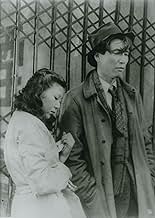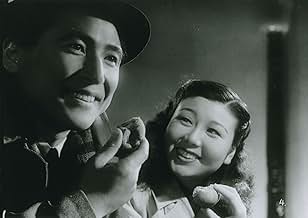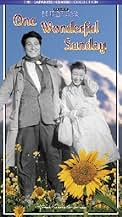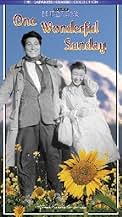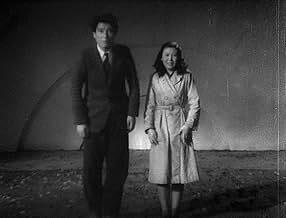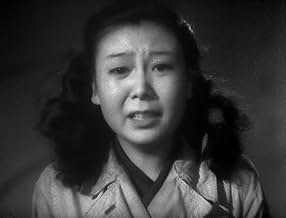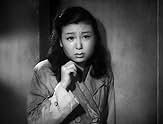IMDb रेटिंग
7.2/10
4 हज़ार
आपकी रेटिंग
अपनी भाषा में प्लॉट जोड़ेंDuring a Sunday trip into war-ravaged Tokyo, despairing Yuzo and optimistic Masako look for work and lodging, as well as affordable entertainments to pass the time.During a Sunday trip into war-ravaged Tokyo, despairing Yuzo and optimistic Masako look for work and lodging, as well as affordable entertainments to pass the time.During a Sunday trip into war-ravaged Tokyo, despairing Yuzo and optimistic Masako look for work and lodging, as well as affordable entertainments to pass the time.
- निर्देशक
- लेखक
- स्टार
- पुरस्कार
- कुल 2 जीत
Sachio Sakai
- Shady Ticket Man
- (बिना क्रेडिट के)
फ़ीचर्ड समीक्षाएं
I had said two weeks ago, in a review of Scandal, that Eclipse's new Kurosawa box set could just as easily be called Lesser Kurosawa. That's not fair. I know there are those who champion The Idiot and No Regrets for Our Youth, and even the one film I had previously seen from the set, I Live in Fear, is quite good (though it's hard to argue with it being a lesser film is such an outstanding oeuvre). The truth was, I was hoping very much to find some lesser-known Kurosawa classics. Which brings us to One Wonderful Sunday. Judging solely by IMDb's votes, it's Kurosawa's third least seen movie. And it ranks #26 out of 30 when listed by ratings. Well, I'll be happy to act like I was the first who discovered this hidden gem in Kurosawa's catalogue. This really is a wonderful little film. Influenced very much by Vittorio de Sica, one of Kurosawa's favorite directors, One Wonderful Sunday follows two young lovers, Yuzo and Masako (Isao Numasaki and Chieko Nakakita), spending the titular day together with nothing but ¥35 between them. The two experience sadness and hardship as they go about their date. The structure is episodic, as the lovers experience odd vignettes, meeting various post-war types, like bums and orphans and ticket scalpers. The two try to be happy with each other's company, but Yuzo's poverty makes him feel like less of a man. In one of the strongest sequences in Kurosawa's career, Yuzo decides to act like a cad to drive Masako away. Kurosawa was hardly ever the subtle type, and he is not known for long periods of silence or long takes. This sequence demonstrates a different side of the director. The climax of the film involves an odd breaking of the fourth wall resembling the device in J.M. Barrie's Peter Pan. As far as I know, this is the only time Kurosawa ever attempted such a thing. That wouldn't be too surprising, though, as film audiences rarely interact with characters on screen. It's just too out there for the medium. But God bless Kurosawa for trying it. It's kind of schmaltzy, but I loved the characters so much that at least I thought about clapping for them. A forgotten near-masterpiece.
This film provides an interesting counterpoint to other Kurosawa films. Its portrayal of post-war Japan recalls Stray Dog, but the poverty and sleaziness in this case are used as the background for a romance between two very attractive young people, who have a Sunday date, but only 35 yen to spend. Yet there is not the gloom of Lower Depths. Both have jobs and we see his minimally decent rental room. The title seems throughout the film to be rather ironic, since most of the situations they encounter, such as being cheated at a snack bar, are far from wonderful. However, Kurosawa puts a positive spin at the conclusion. I agree with another reviewer that the device of having the girl speak to the audience, seeking our sympathy for young couples without money, who wish to marry, is a very awkward device that distracts from our interest in the relationship. However, I disagree with another reviewer who describes the ending as corny: we've all heard of Capra-corny. This film does not come up to Capra's level, but it is reminiscent of his human interest. It seemed to me that the closing device of the girl's making a date for the next Sunday works very well. Every film needs closure, and this one does not deal in high drama at any point, so a highly dramatic climax would not be appropriate. The viewer who wants that should go to Ran or Kagemusha. In my view, the early Kurosawa films showed him how to develop human relationships: a gift that later would be present in the samurai films, and would make them much more than action epics.
Akira Kurosawa's movies have a whole range of themes, be they set in contemporary or in historical eras. To name a few: the chasm between the rich and the poor, between the strong and the weak, between the courageous and the cowards, between the powerful and their foot folk, between the honest and the deceitful, between the clever and the idiots, between the sincere and the dishonest, and also, importantly, between war (destruction and loss) and peace (happiness).
In this movie, made just after WW II, he depicts the struggle for life of 'poor lovers', whose dreams were shattered by the war. Japan is in dire straits: no jobs, and, if you have a job, bad salaries; high rents for decent shelters and huge inflation. 'Free markets' are controlled by 'black' merchants and their thugs. There is still an upper class, which looks with contempt on those without money, their former foot folk. The girl remains optimistic, but her lover is deeply depressed.
Akira Kurosawa made some very risky shots on the music of F. Schubert's unfinished symphony. But, he had the mastery to create the perfect mood. Not to be missed and certainly not by A. Kurosawa fans.
In this movie, made just after WW II, he depicts the struggle for life of 'poor lovers', whose dreams were shattered by the war. Japan is in dire straits: no jobs, and, if you have a job, bad salaries; high rents for decent shelters and huge inflation. 'Free markets' are controlled by 'black' merchants and their thugs. There is still an upper class, which looks with contempt on those without money, their former foot folk. The girl remains optimistic, but her lover is deeply depressed.
Akira Kurosawa made some very risky shots on the music of F. Schubert's unfinished symphony. But, he had the mastery to create the perfect mood. Not to be missed and certainly not by A. Kurosawa fans.
I loved this film for all the reasons already advanced on this board. A story about two lovers who have only each other in a devastated, corrupted, and occupied society is universal in every sense.
I think Kurosawa's postwar films are especially interesting from a political point of view. All of his films had to pass U.S. censors, and so his political comments are shrouded in symbolism and cinematic sleight of hand. American occupation authorities doubtlessly viewed this film as a simple tale of struggling lovers. But a closer look reveals much more.
"Yuzo" is a war veteran down on his luck. Millions of Japanese war veterans returned home to a society ashamed of their service and anxious to forget their failure. "Masako" is his lover but their future together is rendered difficult by their mutual poverty.
Kurosawa gives us glimpses of pathetic war orphans, destitute women forced into prostitution, and a new economic oligarchy made wealthy by black markets. The ruins of Tokyo are presented only on distant horizons or as incidental background, but the damage inflicted by the 20th U.S. Air Force is clearly implied. None of these elements would ever pass U.S. censorship had they been essential to the story.
Postwar Japanese audiences. however, doubtlessly recognized these subtle references to their occupied and devastated country. That Kurosawa could express these matters without provoking American censorship is itself a testament to his artistic skills.
I think Kurosawa's postwar films are especially interesting from a political point of view. All of his films had to pass U.S. censors, and so his political comments are shrouded in symbolism and cinematic sleight of hand. American occupation authorities doubtlessly viewed this film as a simple tale of struggling lovers. But a closer look reveals much more.
"Yuzo" is a war veteran down on his luck. Millions of Japanese war veterans returned home to a society ashamed of their service and anxious to forget their failure. "Masako" is his lover but their future together is rendered difficult by their mutual poverty.
Kurosawa gives us glimpses of pathetic war orphans, destitute women forced into prostitution, and a new economic oligarchy made wealthy by black markets. The ruins of Tokyo are presented only on distant horizons or as incidental background, but the damage inflicted by the 20th U.S. Air Force is clearly implied. None of these elements would ever pass U.S. censorship had they been essential to the story.
Postwar Japanese audiences. however, doubtlessly recognized these subtle references to their occupied and devastated country. That Kurosawa could express these matters without provoking American censorship is itself a testament to his artistic skills.
With this warm and uplifting film, the effect Kurosawa achieves is in the simplicity. The story is threadbare. Two lovebirds try to spend a Sunday together in post-war Tokyo and enjoy themselves with only 35 yen in their pockets. Kurosawa never ceases to amaze me because of his incredibly acute comprehension of the visual effects of a story. The simpler the story is, the more it becomes simply a day in their lives. The more it becomes a day in the life, the more upsetting we find the challenges facing them because of the Occupation and the crumbling economy at the time.
It's almost like a lightweight version of The Lost Weekend. There are no debilitating problems like alcoholism or writer's block. There are just obstructions and inconveniences with which the characters can either roll or stew around.
One Wonderful Sunday is a beautiful slice of life from a time that could be many different times in many different places. It's a peaceful movie about the peace that is always there for a given person, their journey being to find it. I have rarely seen a sequence so beautifully crafted on film as the two lovers in the empty, decaying concrete exterior auditorium, where one resolves to create the music they have been struggling to hear. There is hardly a handful of filmmakers living today that would think of such a thing. Kurosawa may have had the clearest, purest understanding of cinema out of any filmmaker.
It's almost like a lightweight version of The Lost Weekend. There are no debilitating problems like alcoholism or writer's block. There are just obstructions and inconveniences with which the characters can either roll or stew around.
One Wonderful Sunday is a beautiful slice of life from a time that could be many different times in many different places. It's a peaceful movie about the peace that is always there for a given person, their journey being to find it. I have rarely seen a sequence so beautifully crafted on film as the two lovers in the empty, decaying concrete exterior auditorium, where one resolves to create the music they have been struggling to hear. There is hardly a handful of filmmakers living today that would think of such a thing. Kurosawa may have had the clearest, purest understanding of cinema out of any filmmaker.
क्या आपको पता है
- ट्रिवियाThe film's climax was considered a failure in both Japan and the U.S. as audiences refused to clap for the lead characters, though supposedly it went over very well in France, gaining much audience participation.
- गूफ़A clock is seen above a shop in the baseball scene. The time showing is 5:05, but it is still only morning.
- साउंडट्रैकLa Cumparsita
Composed by Gerardo Matos Rodríguez
टॉप पसंद
रेटिंग देने के लिए साइन-इन करें और वैयक्तिकृत सुझावों के लिए वॉचलिस्ट करें
- How long is One Wonderful Sunday?Alexa द्वारा संचालित
विवरण
- रिलीज़ की तारीख़
- कंट्री ऑफ़ ओरिजिन
- भाषा
- इस रूप में भी जाना जाता है
- One Wonderful Sunday
- फ़िल्माने की जगहें
- Toho Studios, टोक्यो, जापान(Studio)
- उत्पादन कंपनी
- IMDbPro पर और कंपनी क्रेडिट देखें
- चलने की अवधि1 घंटा 48 मिनट
- रंग
- ध्वनि मिश्रण
- पक्ष अनुपात
- 1.37 : 1
इस पेज में योगदान दें
किसी बदलाव का सुझाव दें या अनुपलब्ध कॉन्टेंट जोड़ें


